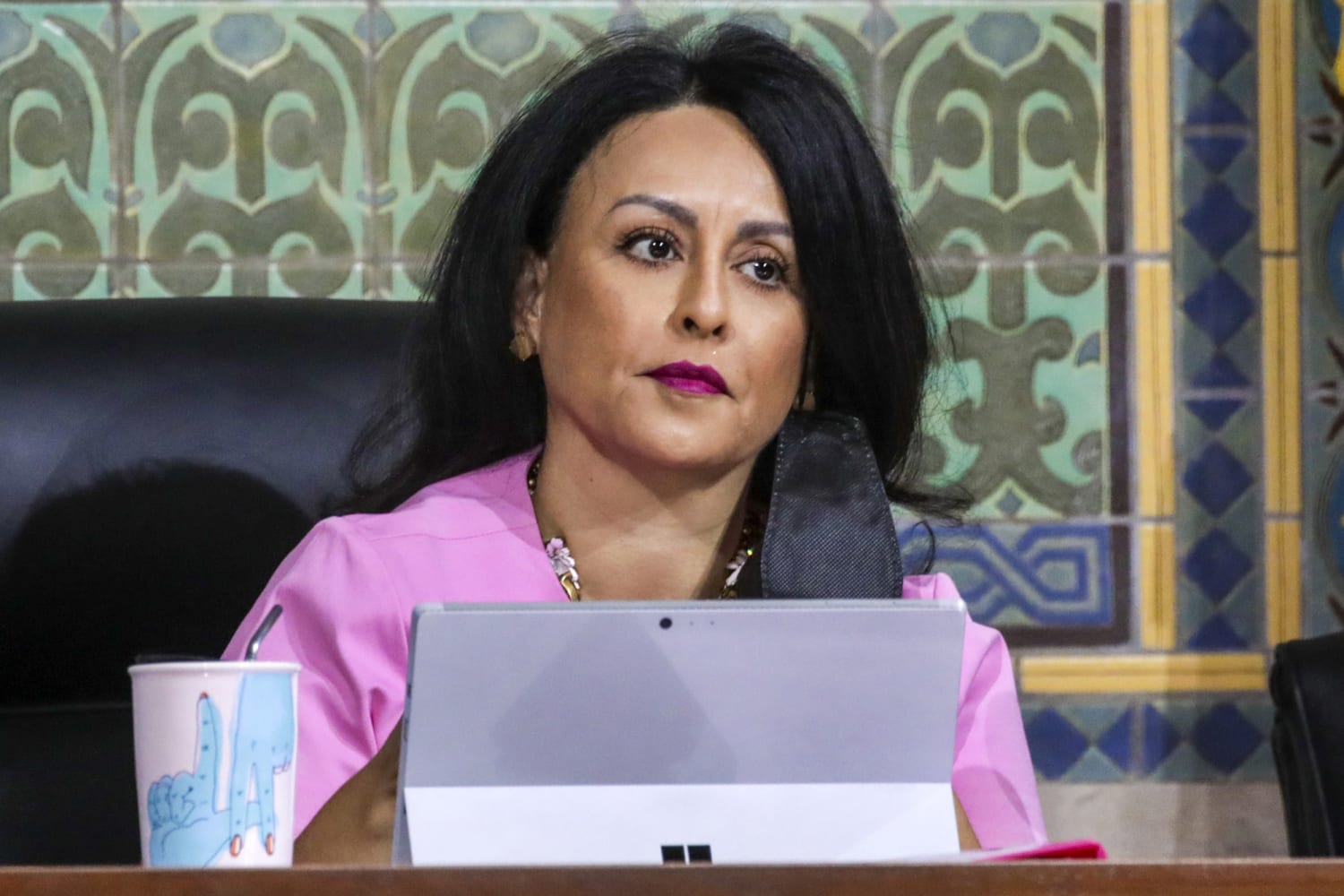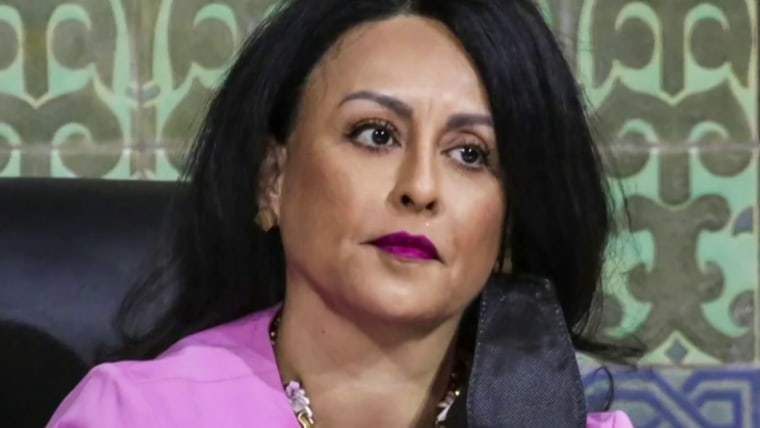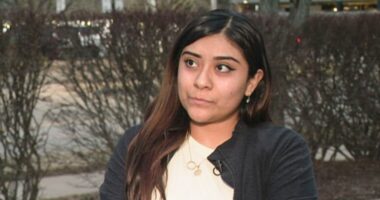Some may want to see the explosive, racist diatribes of a handful of prominent Los Angeles City Council members as an unfortunate incident that will eventually fade away. They might dismiss the remarks revealed in a leaked audio as isolated and confined to a few Latino leaders.
But the reality is that such prejudice from Latino to Latino and Latino to other racial groups is not so uncommon. Call it anti-Black racism, colorism, classism — it all adds up to a destructive strain that is not so hidden in Latino culture.
As the Latino population increases and diversifies, the persistence of racism threatens to dissolve hard-won Latino political and civil rights gains and fracture delicately balanced coalitions with other racial groups.
That was on stark display in the conversation among former Los Angeles City Council President Nury Martinez, council members Kevin De León and Gil Cedillo and Los Angeles County Federation of Labor President Ron Herrera, who resigned Monday.
Martinez, the council’s first Latina president, resigned from the leadership role Monday and resigned her council seat Thursday. She stepped down after a recording revealed she had called her colleague Mike Bonin’s then-2-year-old son, who is Black, a “changuito,” Spanish for “monkey.”
“There are many Nury Martinezes,” said Fordham University law professor Tanya K. Hernández, the author of the recently published book “Racial Innocence: Unmasking Latino Anti-Black Bias and the Struggle for Equality.”
“The idea is: ‘Oh no, not us. We can’t be harboring any kind of racial animosity.’ We need to put a stop to this shield against reckoning because of our Latino ancestry, as if that made us somehow immune to the legacies of slavery,” said Hernández, who is Afro Latina.
The racist remarks extended beyond Blacks to the embedded prejudice against Indigenous Latinos that is pervasive in Latin America and in the U.S., a remnant of colonialism and a version of white supremacy.
Martinez mocked Indigenous Mexican immigrants of Oaxacan descent living in Los Angeles’ Koreatown, calling them “short, dark people.” “I don’t know where these people are from. I don’t know what village they came [from], how they got here. … Tan feos (they’re ugly),” she says in the audio recording.
None of those who were in the room confronted Martinez about the remarks or denounced them as racist.
Latinos with darker skin face entrenched racism in colloquial Spanish, in which the word used to describe them is “negro.” It is not unusual for families to forbid their children to marry Blacks or warn them to stay out of the sun lest their complexions get too dark.
Hernández said that kind of racism against dark-skinned people goes beyond rhetoric and that it has real-world implications.
“When I did research for the book … what I found is in spaces where Latinos have discretionary power, they are employers, supervisors in the workplace, they are homeowners or renting apartments, gatekeepers of public accommodations, hotels, night clubs, restaurants. … In all these public places I found discrimination cases where Latinos were the culprits, the aggressors of the exclusion based on African ancestry.”
Undercutting issues of representation
The council members were discussing redistricting, a process rife with racism and discrimination and oppression of votes of communities of color.
Latino growth in Los Angeles, as in other cities, has occurred in areas where Black populations dominated but have declined, setting up competitions between groups for political representation.
After decades of navigating and negotiating competing interests, “to say that everything has been a bushel of roses is not being honest, because there has been, in fact, competition between the communities for representation, for resources or the ability to have influence on public policy,” said Arturo Vargas, the executive director of the National Association of Latino Elected and Appointed Officials, which called for Martinez’s resignation.
But elected officials’ behavior and actions should not be used to define the relationship between communities, Vargas said. He and others expressed fear that the leaders’ words could sever fragile relationships crafted between racial and ethnic groups, particularly Blacks and Latinos, in the city.
The council members also mocked the Community Coalition, known as CoCo, which works to upend systematic racism and improve relations between Black and Latino people in South Los Angeles.
“These conversations were about Black erasure at the expense of Latino power. And that is wholeheartedly backward regressive — it’s Black voter suppression. And Latinos should take no part of Black voter suppression,” said Alberto Retana, the president and CEO of the Community Coalition, who is Afro Latino
Although Los Angeles is almost half Hispanic, Latinos represent less than a third of the council’s 15 districts, which has highlighted long-standing political tension and concern among Latinos that they are not represented fairly. Black people account for 9% of the city’s population and hold 20% of council seats.
While the state of California uses an independent commission to draw its federal congressional districts, the Los Angeles City Council draws its own districts. An independent commission draws lines for Los Angeles, but its maps are provided only as advisory guides, said Vargas, who has served on two advisory commissions.
The City Council rejected the advisory commission’s redistricting recommendations this redistricting cycle and drew its own lines, he said. The commission proposed preserving three African American seats and creating a district in the San Fernando Valley where Latinos are not the majority but are in high enough numbers to affect its council member’s election.
“But that came at the expense of making significant changes to existing Latino majority districts in the San Fernando Valley, to which at least one incumbent there did not take well to,” Vargas said. “It just goes to show how there is a difference between the interest of the community and the interest of incumbents.”
In the recording, Martinez complains about the redistricting commission’s proposal to remove assets from her district. “If you’re going to talk about Latino districts, what kind of districts are you trying to create?” she asks her colleagues in frustration. “Because you’re taking away our assets. You’re just going to create poor Latino districts with nothing?”
Michele Siqueiros, a civic leader who is the president of the Campaign for College Opportunity, said the leaders “in their narrow ignorance” were focusing on South Los Angeles, where Black leadership has supported Black and brown coalitions and leaders. Instead, she said, they should be growing Latino leadership in the San Fernando Valley and in the Los Angeles Harbor region, which is home to many Latinos, many of whom are represented by white council members.
A leading scholar on equity, Pedro Noguera, an education professor at the University of Southern California, said Latino leaders should have focused on “what do we have in common? And in what ways could we advance a political agenda that serves our interests?”
“That’s not what these politicians were thinking about. They were thinking, ‘How do we take power away from Blacks?’” said Noguera, who is Afro Latino.
Retana said: “There isn’t one major equity fight in Los Angeles that hasn’t involved a Black and brown coalition. That’s the story of victory in L.A., and it’s a story that we have to continue to preserve.”
‘They are inciting hate’
In the recorded comments, Martinez, who is Mexican American, targeted Los Angeles County District Attorney George Gascón, who is of Cuban heritage. “F— that guy, he’s with the Blacks,” she said.
Her offensive comments about Oaxacans was reminiscent of the anti-Indigenous racism at the Academy Awards in 2019, when nominee Yalitza Aparicio, of Oaxaca, endured parodies and rants from light-skinned Latino actors in Mexico.
Zapotecs, or Indigenous people of Oaxacan descent, number about 200,000 in Los Angeles County, one of the largest Oaxacan communities outside Mexico.
Hernández noted that Oaxaca is a place where there are identifiable Afro Mexicans.
Odilia Romero, a co-founder and the executive director of Communidades Indigenas en Liderazgo, or Indigenous Communities in Leadership, said she and the organization hear similar remarks in their daily work and “survived it.” But when they came from elected officials, she was appalled.
“They are inciting hate,” Romero said. “This will come with hate crimes. This will lead to our human rights violations.”
Gabriel Sandoval, who was a civil rights attorney in the Obama administration, said it is important that the elected officials’ comments do not undermine work that has been done.
“The most important role for any leader in L.A. is to be a coalition builder,” Sandoval said. “This is the second-largest, most diverse city in the nation — and that is what is required from any person who holds a position of public trust.”
Follow NBC Latino on Facebook, Twitter and Instagram.
Source: | This article originally belongs to Nbcnews.com











